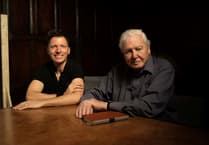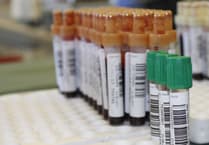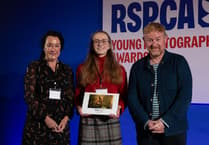Reporter John Hutchins talks to Curly Martin on the release of her book ‘Achievement: Cancer Free for 20 Years’.
WHEN Curly Martin from Tavistock was diagnosed with breast cancer in 1992 and then told by doctors that it had spread aggressively to her lymphatic system and she had just nine months to live, her world, naturally, was turned upside down.
However, after going through the inevitable period of anger, tears and self pity, one morning she woke at her home in Southern Spain to realise just how precious life really was and became determined not to be beaten by the deadly condition.
Curly’s fight and remarkable journey have become the topic of her latest book — ‘Achievement: Cancer Free for 20 Years’.
It is a book that she hopes will inspire those people who suffer from cancer to never give up in their battle and provide hope that a positive mental attitude, allied with progressive, modern medicine, may well not only extend their life but it could even enhance it by using the experience for their own personal growth.
Throughout her book the author’s sense of humour shines through and she admits that laughter is certainly ‘the best medicine’ and to quote a well known Monty Python song, Curly can certainly claim to Always look on the bright side of life.
Since the diagnosis she has become an international, best selling author of ‘The Coaching Handbook’ series of books, an international speaker, a pioneer in life coach training and the founder of a successful training company.
Born in Plymouth, Curly (her name from childhood due to her then very curly locks) lived on a farm in Chillaton and went to Lewdown and Milton Abbot primary schools before going to Tavistock Comprehensive (Tavistock College). She then went into teacher training at Seaford College in Sussex but dropped out and started her career in professional recruitment in London, which she did for 20 years, going on to become a trainer with computer manufacturer Wang. She also had a boyfriend Pete Frizzel — a warrant officer in the Royal Marines.
When she was made redundant from this high pressured job she went to start a new life in Southern Spain. At that time, according to Curly, she was ‘living the dream!’ but when Pete felt a lump on her right breast her world turned upside down.
To add to her woes at the time she also became homeless and unemployed; it also did not help that her partner admitted he could not cope with her illness. After being told by the doctors that she probably had nine months to live, her world began to spiral downwards — made worse when Pete suggested they parted ways.
It triggered a period of putting herself into a ‘self-loathing microscope’ where she questioned her ‘failure at not being successful in life’.
‘I just lay there on the bed full of self pity and thinking, “why me, why me?” Of course I should have asked “why not me?” but at the time I couldn’t see it that way.
‘I blamed myself for the cancer, losing my job, Pete wanting to split up — it was all my fault!
‘I remember sobbing until there were no more tears. I was fed up with crying and fed up with self pity. At the exact moment of this realisation, the sun was rising and the birds started their dawn chorus. I was so exhausted I just looked at the sun rising and listened to the bird song. I stopped sobbing and I stopped the hateful, negative ranting and I just sat quietly looking and listening. In this exhausted state I turned the first corner.’
Through her good friend, Dr Faisal Samji, she was omitted into the renowned Royal Marsden Hospital in London, a cancer specialist facility. When she didn’t have a place to live he offered his home and slowly she began to face up to battling the disease and all its side effects.
At the Royal Marsden, doctors confirmed that her life expectancy would be less than a year and she had an operation to remove the cancer from her breast and from her underarm — then followed chemotherapy.
But her humour prevailed — to look her best Curly was fastidious about her make-up, determined, despite her health, to look her best, especially for visitors.
‘I used a facial bronzer every day so that the face looking back at me in the mirror looked healthy. I looked like I had just returned from a sunny holiday. Due to complications, I was in hospital three times longer than I expected, so by the time I did leave hospital I looked like a carrot!’
While at the Royal Marsden Curly endured a year of therapy — chemo and radiotherapy — and although she did not lose her famous curls her crowning pride became very thin.
It was at this time that Pete asked for and received forgiveness.
In the book she writes: ‘I forgave Pete and the rewards of his forgiveness come every day of our married life.’
In fact ‘forgiveness’ was very much part of her healing process.
Now almost accepting the inevitability of death — if not welcoming it — Curly organised her own 40th birthday party at Bridestowe Village Hall in 1993. It was quite a bash, with a Ceilidh band and a Barber Shop Quartet, courtesy of her cousin Phil Down.
‘In a way it was a sort of goodbye to loved ones and friends. It was also a great way to raise money (£3,000) and thank the Royal Marsden Hospital and other cancer charities.’
Curly was then asked if she would take part in a trial drug.
‘I thought I was going to die anyway. What I didn’t know at the time is that cancer patients who didn’t try the test drugs had less of a life span than those who did; whether it was a placebo effect I don’t know but I honestly felt that if by taking part I could help someone in my position in the future, then it would be worthwhile. To me I had already accepted I was dying.’
It was at this time that she began to try every ‘alternative’ therapy to battle the condition — from acupuncture, essiac herbal and Kombucha tea, mushrooms (not magic), marijuana, colonic irrigation, Neuro Linguistic Programming to laughter therapy.
‘I certainly believe in laughter therapy. There’s nothing like seeing Dawn French fall down a pit as the Vicar of Dibley or that episode in Only Fools and Horses when Del Boy tries to be cool and sophisticated but goes head over heels on his backside in a bar. Laughter releases endorphins into your body so having a laugh is definitely good for you.’
To the astonishment of the doctors at the Royal Marsden, Curly came through her ordeal. Although not entirely free from the threat of cancer she was able to leave hospital. She and Pete moved to Bournemouth, to be near his work. Curly looked to earn a living for herself.
‘I looked to get a job. I had all these skills. I would go to an interview and be offered the job on the spot. Then when they asked me if there were any “health problems” and I told them I was recovering from cancer. Twenty four hours later I would receive a phone call saying that the post was no longer available or they were “restructuring”.’
So, with bills to pay, she decided to take the risk and go self employed as a trainer.
‘My cancer was the catalyst for change in my life. After facing the possibility of death and coming through you have a completely different perspective of things. Before there was part of me that was selfish, bigoted. I thought I was it, with my job in London, a real big city girl.
‘But I woke up when I had cancer. Not only did it turn my life around in a positive way but it made me take stock of who I truly was and I began to appreciate other people more. When I walk down a country lane and see a wild flower in a hedge, I wonder at its beauty. Something that before I took for granted. I also learned to laugh more!’
Curly tells the story of how Pete, who having left the Royal Marines, was retraining to be an electrician. Unfortunately for her he decided to ‘practise’ installing electrical sockets in their flat — which turned the place upside down for days, with no electricity in the middle of winter and ended up with sockets everywhere!
Answering an advertisement for a freelance computer trainer for a local training company Curly was thrown in the deep end when asked to be a last minute replacement to train a computer course to employees of a global bank.
From there she built up her skills not only as a trainer but also being invited to participate in corporate training programmes.
As she says in ‘Achievement: Cancer Free for 20 years’ — changing career is not always a bad thing. Being bold and brave has its rewards.
‘Stepping outside of my comfort zone was the beginning of a completely new way of life.’
Now she is an international speaker, a pioneer of life coaching training (her ‘The Life Coaching Handbook’ sold more than 45,000 worldwide alone). In her training she relates ‘her personal life experiences with accepted methodologies and cutting edge innovations, to create exciting, very entertaining and effective approaches to living a healthy, happy and successful life’.
‘A lot of books on cancer on the market have been about those who have survived five or even ten years after being diagnosed but this is the first one that looks back after 20. What I have tried to do is not just tell people about my experiences but help them to be inspired to not only survive but transform their lives and know they too can have a long term, enjoyable future.’
Turning life’s negatives into positives is now Curly’s mission and hopefully her story and example will give someone, somewhere who has to face the ‘Big C’ that being diagnosed does not necessarily mean an unhappy ending.
‘Achievement: Cancer Free for 20 Years’ by Curly Martin is available in bookshops and online.




